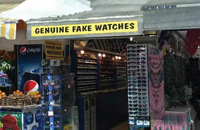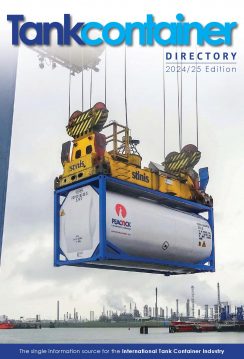There seems little reason to worry about counterfeit parts and spares for ISO tank containers, discovers James Graham
It is a truism that what can be made, can be counterfeited. However, the few who will talk about it suggest that the tank container industry seems to be fairly safe from the efforts of the criminal to pass counterfeit and
forged parts and spares to the sector. As most ISO tank containers at some time are moved on commercial shipping, it is to be expected that the International Maritime Organization (IMO) has taken serious interest in the matter. The issue of counterfeiting is complex and far-reaching. The attraction is far more straightforward. Fake parts in the short-term can be up to 40 per cent cheaper than genuine OEM (original equipment
manufacturer) components. In the long-term, of course, counterfeits can cost far more than the immediate savings made in what is often a fraudulent transaction. Cargo damage and invalidated warranties can be just some of the costs of a counterfeit container part. The complexity in the market comes from the difficulty in identifying what a ‘counterfeit’ actually is. An obviously counterfeited item is one that is copied from an OEM item by unscrupulous individuals, which is subsequently passed off as an original. While the mis-named ‘Rollex’ watch is a comical example, many such items can pass close inspection. July 7, 2017
It is a truism that what can be made, can be counterfeited. However, the few who will talk about it suggest that the tank container industry seems to be fairly safe from the efforts of the criminal to pass counterfeit and
forged parts and spares to the sector. As most ISO tank containers at some time are moved on commercial shipping, it is to be expected that the International Maritime Organization (IMO) has taken serious interest in the matter. The issue of counterfeiting is complex and far-reaching. The attraction is far more straightforward. Fake parts in the short-term can be up to 40 per cent cheaper than genuine OEM (original equipment
manufacturer) components. In the long-term, of course, counterfeits can cost far more than the immediate savings made in what is often a fraudulent transaction. Cargo damage and invalidated warranties can be just some of the costs of a counterfeit container part. The complexity in the market comes from the difficulty in identifying what a ‘counterfeit’ actually is. An obviously counterfeited item is one that is copied from an OEM item by unscrupulous individuals, which is subsequently passed off as an original. While the mis-named ‘Rollex’ watch is a comical example, many such items can pass close inspection. July 7, 2017
You currently do not have access to this article, please login or register to read more.
Login to read more






